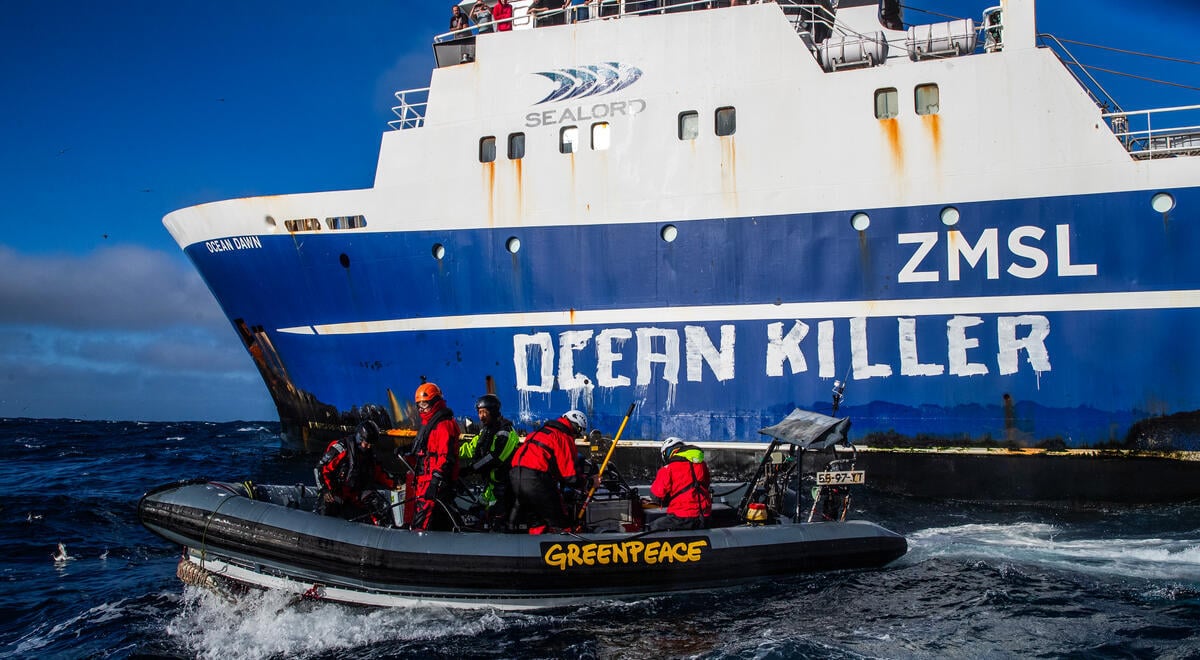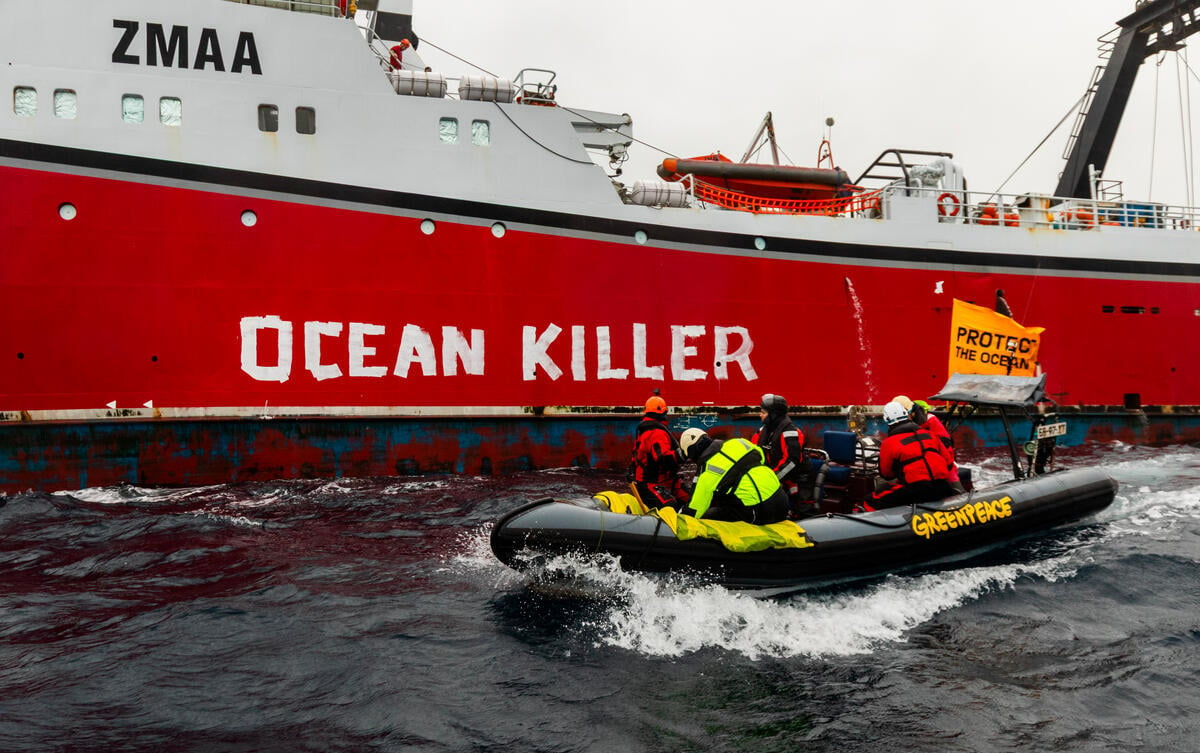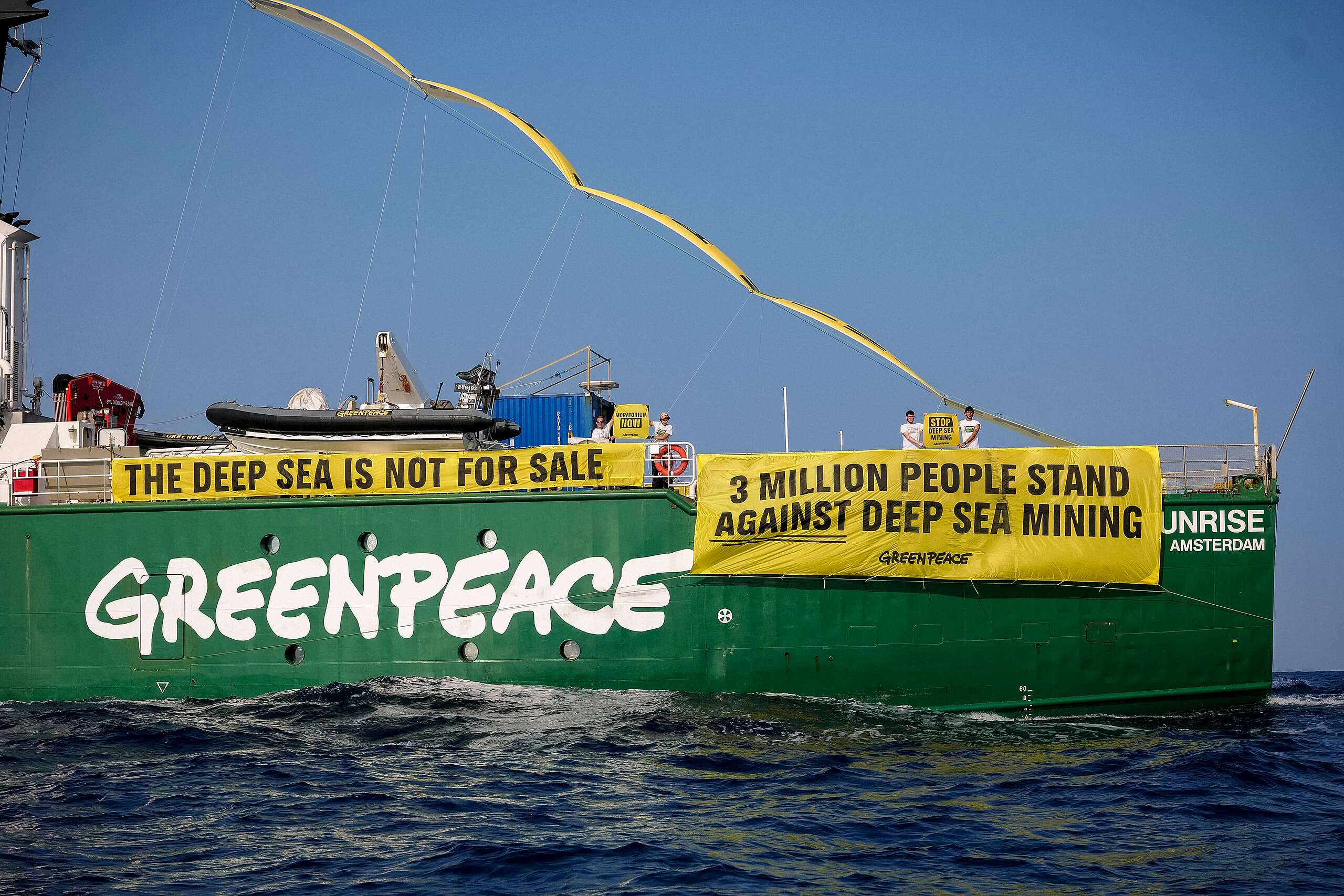The extent of the Luxon Government’s disregard for the environment is becoming clearer by the day.
The fast-track approvals bill is, in Luxon’s own words, a ‘one-stop shop’ – and it really is. It is a one-stop shop for short-cutting environmental protection and undermining democracy. It’s a wrecking ball in this Government’s war on nature.
This week’s announcement of a fast-track advisory group with no discernible environmental expertise adds insult to injury to the whole process.
The panel is stacked with executives from extractive industries and has nobody with any obvious expertise or interest in environmental protection. It is clear the group will be a rubber-stamp process which does not genuinely allow Tāngata Whenua contribution and participation. It’s rife with conflict of interest and wide open to allegations of corruption.
Seabed miners Trans-Tasman Resources seek to end losing streak via low-bar fast-track approvals bill
In the vanguard of Luxon’s war on nature is wannabe seabed miner, serial loser Trans-Tasman Resources which, for more than ten years, has fought and lost in its attempts to start seabed mining off the Taranaki coast.
It appears TTR’s greedy desire to plunder the South Taranaki Bight could be tarnishing the whole fast-track process. Even business-friendly reporters are naming and shaming Trans-Tasman Resources as “the poster child for the worst aspects of the government’s” desire to speed up resource consents for projects and “coming off as way too cocky by half about its prospects under the fast-track scheme”.
Trans-Tasman Resources showed itself cynical and cowardly by bailing out of the Environmental Protection Agency hearing process to bank on Christopher Luxon’s fast-track approvals bill to side-step proper scrutiny of its seabed mining proposal.
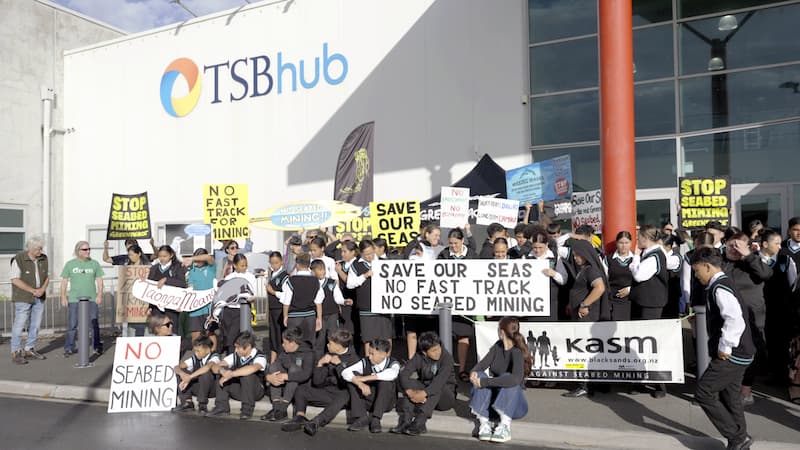
© Clae Baxter / Greenpeace
By giving up on the transparent consent process in which they have been repeatedly defeated by Greenpeace, Ngāti Ruanui, Kiwis Against Seabed Mining, Climate Justice Taranaki and Taranaki locals, TTR effectively admitted that they had no chance of showing that seabed mining can happen without harming the marine environment.
The decision to bail out also demonstrates the power of determined opposition to companies which want to plunder the seas off Aotearoa. They knew they were on a losing wicket.
Fast-Track Approvals Bill a new threat
The Luxon government’s fast-track approvals bill could result in projects like TTR’s seabed mining bid needing only the approval of three government ministers and the new ‘expert advisory group’ (which the ministers can choose to ignore) rather than the current process, which allows for expert input and public consultation and obligates the government to honour Te Tiriti o Waitangi.
If Trans-Tasman Resources gets the go-ahead, it is planning to mine 50 million tonnes of seabed in the South Taranaki Bight every year for 35 years and dump what they don’t need back into the ocean.
The Trans-Tasman Resources project should not be allowed fast track approval because it’s a dangerous threat to precious marine life, such as the pygmy blue whale and the critically endangered Māui dolphin and their application has already been rejected by mana whenua and the Supreme Court.
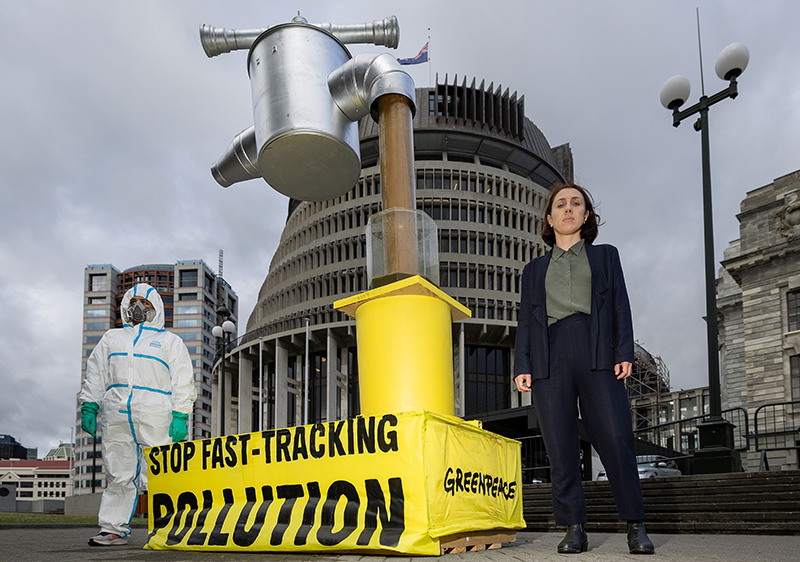
Make your voice heard on the fast-track bill
Ironically, the Government has asked for public feedback on the fast-track bill which will remove the option for public feedback on so many things. So it’s vital that as many of us as possible raise our voice in opposition! We’ve made it easy for you here – just add your name and send a message of protest.
But if Trans-Tasman Resources thinks that they will have an easy ride under the fast-track process, they better think again. Just as the oil industry faced a decade of relentless resistance from iwi, environmental groups and people all over Aotearoa, so too would these wannabe seabed miners. We can see it already. As I write this, over 6,000 people have already used our easy submission guide to oppose the fast-track bill and that number is climbing steadily.
There is the added danger that if seabed mining is approved in Aotearoa, it’ll be the thin end of the wedge. The industry does not exist anywhere else in the world and if it starts here in Aotearoa, it could pave the way for more wannabe miners to plunder deep seas teeming with pristine ecosystems in the Pacific and around the world.
Deep Sea Mining Industry tries to silence protest at International Seabed Authority meeting
Seabed mining in the South Taranaki Bight is a threat to the marine environment there, but it would also set a precedent that would make it harder to stop similar projects elsewhere in Aotearoa and further afield. There is no commercial-scale seabed mining of this kind anywhere else on the planet.
Deep sea miners such as The Metals Company (TMC) will be looking at what is happening in Aotearoa and push even harder for a licence to mine precious waters adjacent to Hawai’i.
Greenpeace has also been campaigning to stop deep sea mining in the Pacific with protest at sea and tireless advocacy at international meetings.
As usual, The Metals Company was present at the annual meeting of the shady UN regulator, the International Seabed Authority, and tried to gain support to silence us by imposing restrictions on our boats and protests at sea or kicking Greenpeace out of ISA meetings, but they failed on all attempts. The Metals Company wants a licence despite so many unresolved issues and no final regulations in clear sight.
TMC has also admitted their proposal hasn’t taken into account any cultural considerations, as reported by Solomon Pili Kahoʻohalahala, who attended the meeting with the Greenpeace delegation. He says that Indigenous knowledge and perspectives have been shut out of negotiations for too long.
Extractivism – the removal of large quantities of raw or natural materials with little thought for the consequences and decision-making without us at the table, is continued colonisation that threatens our heritage lands, oceans and taonga species is racism.
Seabed mining industry and politicians undermine Te Tiriti o Waitangi
This is happening here in Aotearoa, too. Industry lobbyists are being schmoozed by politicians with dollar signs in their eyes and given power that won’t be afforded to Tāngata Whenua.
When industry influences politics, we end up with short-term privatised profits, socialised costs and long-term consequences on our environment.
Instead, there should be a transparent decision-making process focused on the best available science, together with Indigenous Peoples and their Indigenous knowledge systems that could sustain us for generations to come.
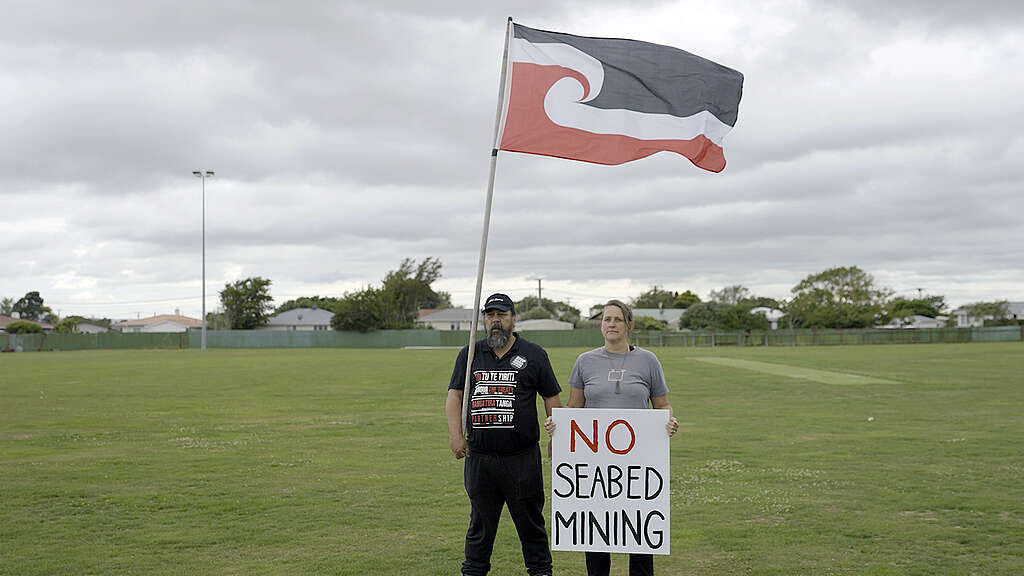
© Clae Baxter / Greenpeace
If Christopher Luxon’s fast-track bill is pushed through, Te Tiriti will be undermined as the ability for Tāngata Whenua to inform decisions on projects with our worldview and expertise as rights holders and custodians will be constricted. And the same can be said for many more who are authoritative on marine mammals and seabirds that must be heard.
We have a small window to voice our opposition to this bill, which seeks to give ministers unbridled power and limit our access to participatory democracy.
Please take action now to stand up for nature and democracy by raising your voice against the fast-track bill.
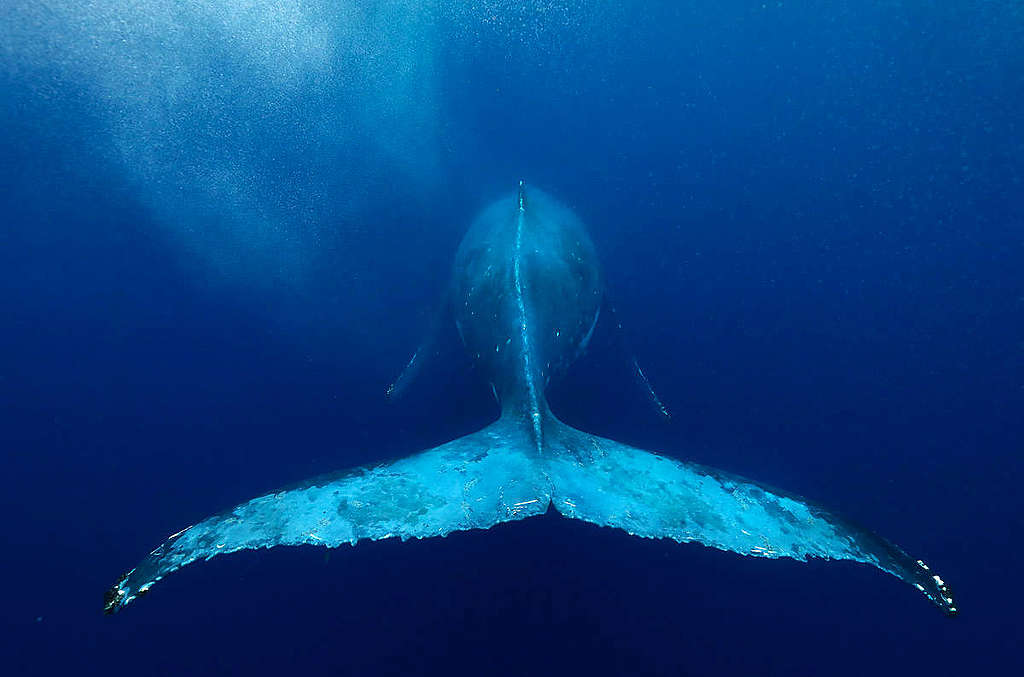
Seabed mining is a new threat to the oceans. Now is our chance to prevent the destruction before it’s too late.
Add my name

